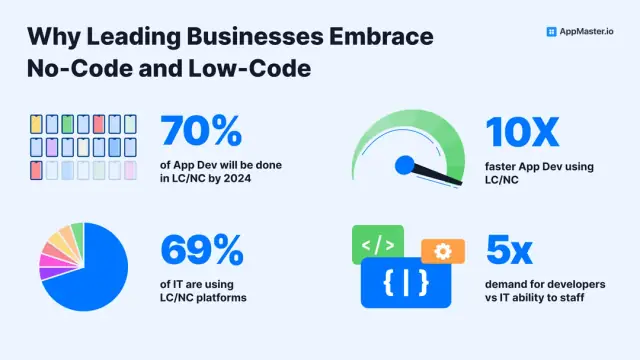A Beginner's Guide to No-Coding Application Builders
Discover the world of no-code application builders and how they empower individuals with little or no coding experience to create sophisticated applications. Learn the basics, benefits, and popular platforms.

What are No-Code Application Builders?
No-code application builders are platforms designed for individuals with little or no programming experience to create sophisticated software applications. These platforms empower users to develop professional-grade applications by providing intuitive visual interfaces, a set of pre-built modules, drag-and-drop functionality, and readily available templates.
By leveraging no-coding application builders, users can focus on their unique concepts and functionality requirements without worrying about writing complex code or dealing with technical issues traditionally associated with app development. These platforms allow non-technical users, such as entrepreneurs, designers, and citizen developers, to bring their innovative ideas to life and build custom software solutions without relying on software engineers or development teams.
No-code builders are increasingly popular due to the growing demand for digital transformation and simplified app development processes across industries. With these platforms, businesses can equip their team members with a powerful solution to create, maintain, and iterate on their applications, ensuring agility and flexibility in meeting evolving customer and market needs.
Why Use No-Code Application Builders?
Using no-coding application builders provides several benefits that can streamline the development process and empower individuals and businesses to create unique software solutions. Some of the key reasons to use no-code builders include:
- Lower Development Cost: No-code platforms minimize the need for hiring software engineers or outsourcing app development, reducing the cost of creating applications. They allow businesses to invest their resources in other crucial aspects, such as sales, marketing, and customer support.
- Accelerated Time-to-Market: With easy-to-use visual interfaces, drag-and-drop functionality, and an extensive set of pre-built modules, no-code platforms enable rapid creation and deployment of applications. This accelerated process allows businesses to respond to market opportunities swiftly, gaining a competitive edge.
- Easy Customization and Maintenance: No-code platforms facilitate the customization of applications according to specific needs and preferences, allowing users to differentiate their software solutions. Furthermore, these platforms simplify the maintenance process, making it easier for users to update, modify, or fix issues in the app without the need for complex coding adjustments.
- Reduced Technical Debt: Technical debt often results from suboptimal coding practices or outdated technologies, causing long-term issues and increased maintenance costs. Since no-code builders generate code automatically and follow the latest software development standards, the risk of accumulating technical debt is minimized.
- Democratizing App Development: No-code platforms democratize software development, making it more accessible to individuals and businesses without extensive programming knowledge or experience. This democratization fuels innovation and enables a broader range of people to contribute to the digital transformation of industries.

Key Features of No-Code Application Builders
No-code application builders come with various features and functionalities, providing users a comprehensive suite of tools to create versatile applications. Some of the essential features of no-code builders include:
- Visual Interface: A key aspect of no-code builders is the easy-to-use visual interface that allows users to design applications based on their specific requirements. Users can drag-and-drop components and customize them using the interface, making the design process intuitive and efficient.
- Pre-built Modules: No-code platforms offer a range of pre-built modules, such as user authentication, database management, and integrations with third-party services, which help users implement the desired functionality without writing any code. These modules simplify the app development process and save time.
- Templates: Many no-code builders provide a repository of application templates for various industries and use cases to help users jumpstart their projects. These templates serve as a foundation that can be customized to match the specific requirements of each user.
- Integration Support: No-code platforms enable seamless integration with third-party tools, such as CRMs, payment gateways, and analytics platforms. This feature helps users streamline workflows, automate processes, and enhance the functionality of their applications.
- Responsive Design: With no-code builders, users can create responsive applications that adapt to different screen sizes and devices. This capability ensures a consistent user experience across various platforms, such as web, mobile, and tablet.
- Collaborative Environment: Some no-code platforms offer collaboration features that allows multiple team members to work together on a project in real-time. These collaborative tools help improve communication and efficiency during the app development process.
Choosing a no-code application builder with comprehensive features is crucial for creating versatile and complex applications. One such platform is AppMaster, which provides a powerful no-code solution for easily creating backend, web, and mobile applications. With its extensive features, such as visual data model creation, business logic design, API management, and customizable UI, AppMaster is a reliable choice for any no-code app development project.
Popular No-Code Builders and Their Unique Selling Points
In recent years, the no-coding application builder market has seen many innovative platforms catering to individuals and businesses worldwide. Let's explore some of the most popular no-code builders available and their unique selling points.
AppMaster
AppMaster is a comprehensive no-code platform allowing customers to visually build backend, web, and mobile applications. This platform lets you design data models, create business logic, design REST APIs, and web socket endpoints.
With its powerful visual interface and wealth of features, AppMaster has been recognized as a G2 High Performer in multiple categories, including No-Code Development Platforms, Rapid Application Development (RAD), and API Management. Users of AppMaster can take advantage of built-in hosting or opt for exporting their binary files for on-premises deployment, depending on their subscription plan. The platform significantly speeds up application development while greatly reducing development costs.
Wix
Wix is a popular no-code builder primarily creating responsive websites and web applications. It boasts a user-friendly drag-and-drop interface, a wide selection of professional templates, and third-party app integrations. Wix enables e-commerce functionality, SEO optimization, and custom domain support, making it ideal for creating and managing professional web presence.
Airtable
Airtable is a unique blend of spreadsheet and database functionalities, making it a popular choice for managing data and collaborating on projects. With its visually appealing interface and diverse features, you can create apps for various use cases, such as project management, customer relationship management, and event planning. Airtable is excellent for organizing, storing, and analyzing data in a user-friendly format.
Bubble
Bubble is a versatile no-code platform designed for web application development. With its visual editor, you can create web applications complete with user authentication, data storage, and integrations with third-party services. Bubble offers a wide range of customizable templates and plugins, making it an excellent choice for aspiring app developers.
Adalo
Adalo is a no-code platform specializing in mobile app development. It allows users to create custom mobile applications for iOS and Android devices using a straightforward drag-and-drop interface. Adalo offers templates, components, and integrations to help users create mobile apps quickly and efficiently.
Getting Started: Choosing the Right No-Code Builder
Selecting the best no-code builder for your needs can seem daunting, but keeping certain factors in mind can help simplify the decision-making process:
- Project Type: Consider the type of application you want to develop. Some no-code builders focus on specific project types, such as web apps or mobile apps, while others, like AppMaster, cater to a broader range of options.
- Platform Features: Analyze the features and functionality each no-code builder offers. Some platforms provide many integrations, templates, and components, while others may have limitations. Ensure the platform you choose can meet your project requirements.
- Budget: Research the pricing options for various no-code builders to find one that suits your budget. Most platforms offer a range of pricing plans catering to different user types. Some platforms also have a free trial or freemium model to explore before investing in a subscription.
- User Experience: Opt for no-code application builders with a user-friendly interface and excellent usability. Read reviews, evaluate the learning curve, and try out demos or free trials to ensure that the builder is easy for you to use.
- Scalability: Your app should be capable of handling growth and increased usage over time. Choose a no-code builder that allows you to scale your application without running into performance issues or substantial redevelopment costs.
Launching Your First No-Code App: Practical Tips
Diving into the world of no-code app development can be exciting and rewarding. Here are some practical tips for launching your first no-code app:
- Plan Ahead: Before building, create a roadmap outlining your app's key features, target audience, and expected outcomes. A clear plan will help you navigate the app-building process more efficiently.
- Choose an Appropriate Template: Many no-code builders provide a range of templates that can be customized to suit your needs. Select a template that closely matches your app's design and functionality requirements to save development time.
- Focus on User Experience: Prioritize your app's user experience by designing easy-to-use and intuitive interfaces. Consider your target audience's expectations and preferences and ensure the features are catered to their needs.
- Test, Iterate, and Improve: Don't expect your app to be perfect from the get-go. Test your app thoroughly, gather user feedback, and continually iterate and refine its design and features for the best possible outcomes.
- Explore Integrations: No-code platforms often support various third-party integrations, which can augment your app's functionality. Investigate the available integrations to find ones that can enhance your app's performance and address your users' needs.
- Market Your App: Once you've created your no-code app, spread the word about it. Leverage social media channels, online communities, and other marketing avenues to promote your app and attract users.
Embracing no-code application builders can empower you to transform your ideas into fully-fledged applications easily. Use the right no-code platform, follow these practical tips, and start realizing your app development dreams today.
FAQ
No-code application builders are platforms that enable individuals with little or no coding experience to create sophisticated applications using visual interfaces, drag-and-drop functionality, and readily available templates.
Benefits of no-code application builders include lower development cost, faster time-to-market, easy customization, reduced technical debt, and empowering non-technical users to create software solutions.
No-code platforms are popular because they democratize app development, allowing individuals and businesses to create unique software solutions without the need for extensive programming knowledge or experience.
Some popular no-code application builders include AppMaster, Wix, Airtable, Bubble, and Adalo.
Yes, most no-code platforms are powerful enough to create complex applications featuring various integrations, customizability, and unique design elements, catering to a wide range of use cases.
While no-code builders can handle a variety of use cases, some highly specialized or critical applications might require custom development using traditional programming languages and frameworks.
No, no-code application builders are designed for users with little or no programming experience, offering visual interfaces, drag-and-drop functionality, and templates to simplify the app-building process.
Depending on the platform, some no-code builders allow you to host applications on your own servers, while others require using their hosting services. For example, AppMaster offers subscription plans enabling hosting on-premises.






